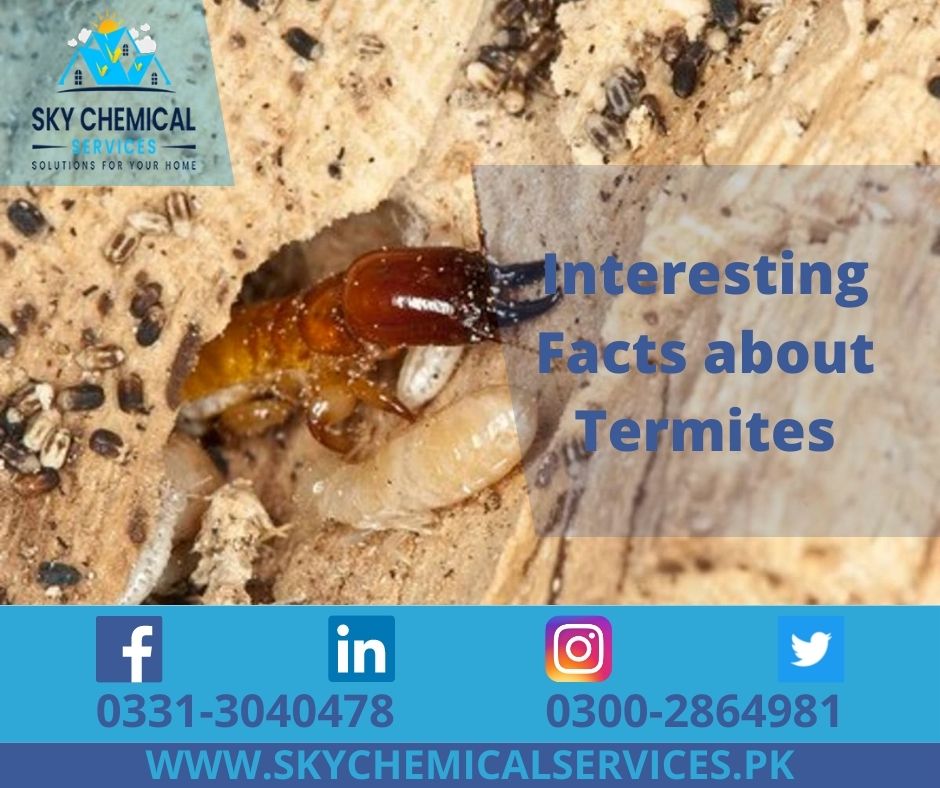
Termites are living creatures that feed on different substances present in homes or offices, especially wood (worn-out and bacteria-prone). Facts about Termites they also feed on carpet, insulation, cardboard, fabric and various other materials.
To know more about termites, here are some interesting facts that you would like to know.
Facts
- Facts about Termites have been a part of the environment for millions of years: The first termites are thought to have existed some 250 million years ago. To put this in context, the first dinosaurs lived around 230 million years ago.
- Termites are divided into three categories: A monarch or queen termite (or several), soldiers, and workers live in each termite colony.
- Termites don’t just devour wood; they’ve also been found to chew plastic, textiles, even wallpaper.
- Termites create massive mounds by tunneling through mud to get to and from their nests and the wood they consume. Their nests may be up to 12 inches in diameter. A 42-foot-high mound unearthed in Africa was almost the same height as a Brachiosaurus.
- Termites are extraordinarily fast: they hold the world record for the quickest movement of all animals and insects.
- Termites consume a lot of food and create a lot of gas as they breakdown food to eat. Termites emit up to 150 million tons of methane gas every year, according to experts.
- Each termite is a microbial gold mine: Termites can have up to 1,400 bacteria species in their hindgut alone.
- Soldier termites utilize vibrations to communicate: when they detect a threat, they knock their heads against the colony’s walls. This causes vibrations in the mound and nest, alerting the remaining termites.
- Certain people eat termites as a delectable snack: In some places of the world, termites are consumed to treat illness or as a dietary mainstay. People in Singapore consume termites that have been soaked in alcohol or rice wine, as well as live termites. To get rid of the illness, Amazonian natives inhale the smoke from burning termite nests. Queens lay a lot of eggs and can live for up to 20 years: An African termite colony’s queen may lay up to 40,000 eggs each day, with an egg being laid every 15 seconds on average.
Where do termites find food?
- Presence of cellulose (wood and other materials) is extremely abundant on ground. Also, if the termites go underground, they are likely to find more of it.
- Various objects rocks, trees and roots), cracks or gaps in the soil.
- Increasing amounts of soil moisture.
- Termites follow the scent of fungi which is particularly associated with food.
- If there is urgent requirement of food, the colony sends a large amount of termites to go and search for food.
How do Termites eat food?
Termites can manage wood, plant matter and fungi with their special asymmetrical mandibles that allow them to tear into their preferred food and start consuming it quickly. They can chew and swallow their meal using their muscular mouthparts, allowing their unique gut flora to break down the cellulose into energy. It’s worth noting that not all termites in the caste system can digest cellulose.
The worker caste is responsible for feeding other termites, a process known as trophallaxis. The termites will be fed mouth-to-mouth or anus-to-mouth by the workers. Another interesting feature of termites’ diet is their symbiotic association with the fungus Termitomyces. These fungi are grown in a fungus comb by termites and allowed to develop within their mounds.
Does Rain Increase Flying Termite Activity?
How can Termite Infestation lower your Home Value?
Chemicals used for Termite Proofing.
Conclusion
Termites are wood-eating creatures that have the potential to devour different objects present in a building. Examples are furniture, fixtures, paper, fabric, carpet, and others. With regards to their properties, termites are fast-paced and consume a lot of food during their eating hours. In addition, they emit up to 150 million tons of methane gas every year, according to experts.
If you like to know more about our services, visit (https://skychemicalservices.pk/)
